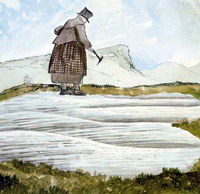Items
Site
The Medicine Chest
keywords is exactly
memory
-

Taxonomy
Visually categorising a selection of my research material (accumulated since 2015). -

Fools and other stories
My copy of Ndebele’s 'Fools and other stories', read and underlined in 2001. -

A perfect day for bananafish
Extract from J.D. Salinger's 'For Esmé - With Love and Squalor' in which Seymour Glass interacts with a young girl while swimming in the ocean on holiday. “Miss Carpenter. Please. I know my business,” the young man said. “You just keep your eyes open for any bananafish. This is a perfect day for bananafish.” “I don’t see any,” Sybil said. “That’s understandable. Their habits are very peculiar.” He kept pushing the float. The water was not quite up to his chest. “They lead a very tragic life,” he said. “You know what they do, Sybil?” She shook her head. “Well, they swim into a hole where there’s a lot of bananas. They’re very ordinary-looking fish when they swim in. But once they get in, they behave like pigs. Why, I’ve known some bananafish to swim into a banana hole and eat as many as seventy-eight bananas.” He edged the float and its passenger a foot closer to the horizon. “Naturally, after that they’re so fat they can’t get out of the hole again. Can’t fit through the door.” “Not too far out,” Sybil said. “What happens to them?” “What happens to who?” “The bananafish.” “Oh, you mean after they eat so many bananas they can’t get out of the banana hole?” “Yes,” said Sybil. “Well, I hate to tell you, Sybil. They die.” “Why?” asked Sybil. “Well, they get banana fever. It’s a terrible disease.” “Here comes a wave,” Sybil said nervously. “We’ll ignore it. We’ll snub it,” said the young man. “Two snobs.” He took Sybil’s ankles in his hands and pressed down and forward. The float nosed over the top of the wave. The water soaked Sybil’s blond hair, but her scream was full of pleasure. With her hand, when the float was level again, she wiped away a flat, wet band of hair from her eyes, and reported, “I just saw one.” “Saw what, my love?” “A bananafish.” “My God, no!” said the young man. “Did he have any bananas in his mouth?” “Yes,” said Sybil. “Six.” The young man suddenly picked up one of Sybil’s wet feet, which were drooping over the end of the float, and kissed the arch. “Hey!” said the owner of the foot, turning around. “Hey, yourself! We’re going in now. You had enough?” “No!” “Sorry,” he said, and pushed the float toward shore until Sybil got off it. He carried it the rest of the way. (Salinger 1986: 20-21). -

Ma
The Japanese have a word, ‘ma’, for this interval which gives shape to the whole – this ‘gap’, ‘opening’, ‘space between’ or ‘time between’. Ma is not something that is created by compositional elements, rather it can be understood as the thing that takes place in the imagination of the human who experiences these elements. A room, for example, is called 'ma', as it refers to the space between the walls. Or a rest in music, which indicates a pause between the notes or sounds (Pilgrim 1986: 255). -

Where their lives took on true weight
In Alice Munro's short story 'Post and Beam', the two protagonists return home from a short vacation: "Up Capilano Road, into their own part of the city and their own corner of the world, where their lives took on true weight and their actions took on consequences. There were the uncompromising wooden walls of their house, showing through the trees" (Munro 2001: 212). -

House
Lokrete with metal armature Grove Road, London, E3 (Destroyed 11 January 1994) -

Burrowing
Extract from 'A Child in Time': "Later, in the sorry months and years, Stephen was to make efforts to re-enter this moment, to burrow his way back through the folds between the events, crawl between the covers, and reverse his decision. But time – not necessarily as it is, for who knows that, but as thought constituted it – monomanically forbids second chances" (McEwan 1987: 14). -

Four bruises
Poster designed by film director, Mike Mills. His 2010 movie, 'Beginners', is structured as a series of interconnected flashbacks. Following the death of his father, Hal, from cancer, Oliver reflects on their relationship during the last five years, since the death of his mother. -

"I have scars on my hands from touching certain people"
"The words of Seymour Glass, eldest sibling of the Glass family – a lesser known creation of J.D. Salinger’s literary world. The story of this family of child geniuses, who appeared on a 1927 radio quiz show called 'It’s a Wise Child', is chronicled in three of his books – mostly centering on the relationship between the two eldest brothers, Buddy and Seymour. Salinger favours Seymour. He was the most brilliant and idiosyncratic of all the children and unfortunately, for the most part, only present as a memory – since he committed suicide, age 31. Buddy reminisces about one specific Seymour moment: His mother urging him to see a psychiatrist and him telling her that he doesn’t need a head doctor – he needs a hand doctor or a dermatologist, whereupon he looks at his hands and tells her he has these scars – these discolourations on them – from touching certain people. Certain heads, certain colours and textures of human hair leave permanent marks on him. When he put his hand on his little sister Franny’s head when she was still in the carriage, it left a mark. Or with her twin brother, Zooey, when he was six or seven, during a spooky movie. He put his hand on Zooey’s head when he went under the seat to avoid watching a scary scene. It left a mark. Other things, too. Charlotte, the girl he was in love with, tried to run away from him once and he grabbed her dress. It left a permanent lemon-yellow mark on the palm of his right-hand (Salinger 1964:59). His hands were filled with these discolourations – these physical manifestations of his emotions. They became a type of medical condition. And he needed to cure it" (Liebenberg 2011: 91 - 93). Salinger recounts the day of Seymour's suicide in a short story he later wrote, called 'A Perfect Day for Bananafish'. -

"I've decided to stop pitying myself"
“Her purse is half open, and I see a hotel room key, a metro ticket, and a hundred-franc note folded in four, like objects brought back by a space probe sent to earth to study how earthlings live, travel, and trade with one another. The sight leaves me pensive and confused. Does the cosmos contain keys for opening up my diving bell? A subway line with no terminus? A currency strong enough to buy my freedom back? We must keep looking. I'll be off now". An extract from Jean-Dominique Bauby's 'The Diving Bell and the Butterfly', the memoir which he dictated after suffering a stroke in 1995. The stroke rendered him mute and almost completely paralyzed, except for the movement of his left eyelid. Bauby dictated his memoir through blinking as his speech therapist listed the letters of the alphabet. When his doctor told him his prognosis, he mentioned that in the past , he would have simply died from this type of stroke, but that improved resuscitation techniques had now prolonged and refined the agony of this condition: "You survive, but you survive with what is so aptly known as 'locked-in syndrome'”.


